| Srl | Item |
| 1 |
ID:
156100
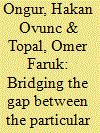

|
|
|
|
|
| Summary/Abstract |
This paper investigates whether the Turkish intellectual Cemil Meriç’s metaphor of silent yet peaceful communication among world literature classics on the same bookshelf might be employed in international political theory in contrast to traditional cosmopolitan or communitarian approaches, which favor either the particular or the universal in constructing social actors. Reviewing Meriç’s works and his conceptualizations of umran and irfan, we first inspect the underlying separation between what Meriç calls the processes of nationalism and nationalization. Meriç defines the latter as a form of people’s construction, which curiously echoes Ernesto Laclau’s definition of social articulations among conflicting particularities under a universal signifier. We then attempt to extend Meriç’s approach toward the international in order to transcend the Westphalian tradition in international relations and to reinterpret Andrew Linklater’s normative cosmopolitanism by lifting the prerequisite of dialogue among international actors for peaceful coexistence.
|
|
|
|
|
|
|
|
|
|
|
|
|
|
|
|
| 2 |
ID:
156093
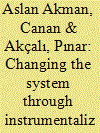

|
|
|
|
|
| Summary/Abstract |
Since the 1990s, debates on a constitutional system reform in Turkey have ignited controversies over the executive structure of its parliamentary system. This article looks at the debate in terms of the interaction between institutional dynamics and politicians’ choices, shaped by past institutional transformations following transitions. It is contended that institutional weaknesses underlying both the presidency and executive–legislative relations in Turkey have provided strong incentives for incumbent elites to challenge existing parliamentary norms and advocate presidential alternatives. Far from contributing to a sober diagnosis of the problems of parliamentarism, the recent constitutional amendment introducing a system of executive presidency has further divided Turkey’s already polarized political and civil society.
|
|
|
|
|
|
|
|
|
|
|
|
|
|
|
|
| 3 |
ID:
156098


|
|
|
|
|
| Summary/Abstract |
The present study explores civil society organizations’ (CSOs) civic and political potential in Turkey. For this purpose, it generates original data from Antalya and utilizes social network analysis to analyze the CSOs’ cooperation structure. The analysis points out certain levels of dynamism and diversity in terms of the CSOs’ cooperative connections. Yet it also shows variance between the public-goods oriented Putnam-type CSOs and the special-interest oriented Olson-type CSOs in terms of their civic and political potential. This observed variance, in turn, is likely to influence their respective potential to articulate common interests on the one hand, to affect politics on the other hand.
|
|
|
|
|
|
|
|
|
|
|
|
|
|
|
|
| 4 |
ID:
156094
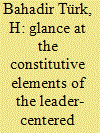

|
|
|
|
|
| Summary/Abstract |
Leadership is a major aspect of Turkish politics; leaders in Turkish politics are regarded as either almost sacred figures or the ultimate reason for all political, social and economic problems. Leaders are seen as decision makers who have a significant impact on almost all aspects of life. It can be contended that a historical continuance toward the leader-centered perspective is present in Turkish politics. This paper aims to present a descriptive framework outlining the elements that constitute the leader-centered perspective in Turkish politics. To accomplish this goal, the paper presents two major arguments. It is argued that the constitutive elements of the leader-centered perspective in Turkish politics are a sui generis synthesis of patrimonialism, patriarchy, populism and militarism. Furthermore, this fourfold historical structure strengthens forms of charismatic leadership and can provide insight into the central role of leadership in Turkish politics.
|
|
|
|
|
|
|
|
|
|
|
|
|
|
|
|
| 5 |
ID:
156097
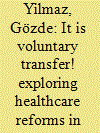

|
|
|
|
|
| Summary/Abstract |
The Turkish healthcare system has been transformed in the 2000s by adopting a comprehensive health model – the so-called Turkish Model. Although Europeanization dynamics were effective in Turkey in recent decades due to the acceleration of European Union (EU) accession process after 1999, healthcare reforms demonstrate a distinct process. This article analyzes the factors behind the health transformation through employing a policy transfer framework. It argues that a parallel process of health-policy transfer with Europeanization in other areas emerged in Turkey, and rather than the EU push, the Turkish healthcare model was a result of voluntary engagement for eliminating problems in this domain.
|
|
|
|
|
|
|
|
|
|
|
|
|
|
|
|
| 6 |
ID:
156096
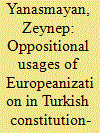

|
|
|
|
|
| Summary/Abstract |
The European Union has traditionally played an anchoring role in Turkey, pushing the Republic towards the enhancement of fundamental rights and freedoms. However, the decreasing credibility of the project for EU membership after 2005 has gradually led to selective reforms being introduced, and most recently to de-Europeanization. Against this quickly changing background, this paper seeks to investigate the usages of Europeanization by domestic political actors during the discussions on the recently failed constitution-making process (2011–2013). It specifically focuses on deliberations over religious freedom, and argues that Europeanization has continued to serve as the normative context in constitution-writing.
|
|
|
|
|
|
|
|
|
|
|
|
|
|
|
|
| 7 |
ID:
156099
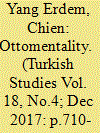

|
|
|
|
|
| Summary/Abstract |
This essay proposes an alternative concept – Ottomentality – in order to more adequately assess Turkey’s growing neo-Ottoman cultural ensemble. This concept is deployed here to underscore the convergence of neoliberal and neo-Ottoman rationalities and the discursive practices that are developed around them for governing culture and managing a diverse society. The essay contends that the convergence of these two rationalities has significantly transformed the state’s approach to culture as a way of governing the social, constituted a particular knowledge of multiculturalism, and a subject of citizenry increasingly subjected to exclusion and discipline for expressing critical views of this knowledge.
|
|
|
|
|
|
|
|
|
|
|
|
|
|
|
|
| 8 |
ID:
156095
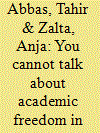

|
|
|
|
|
| Summary/Abstract |
In January 2016, 1128 predominantly Turkish intellectuals signed an Academics for Peace petition to draw attention to the conflict in southeastern Turkey. Their actions were met with outcry from the government, accusing the signatories of disloyalty to the state, even treason. This paper is an analysis of the responses of 60 of these scholars to a questionnaire sent to the entire Academics for Peace email list. Respondents, including 58 signatories, provided various perspectives on academic freedom in Turkey, as well as their own experiences of signing the petition. We contend that the responses faced by these intellectuals illustrate the homogenizing effects of power to silence criticism and ensure loyalty to the government and its ideas of Turkishness. It reflects a continuation of the suppression of academic freedom in Turkey, an issue that sees little sign of abatement or reform in the light of present challenges.
|
|
|
|
|
|
|
|
|
|
|
|
|
|
|
|